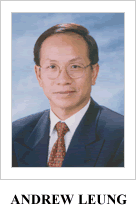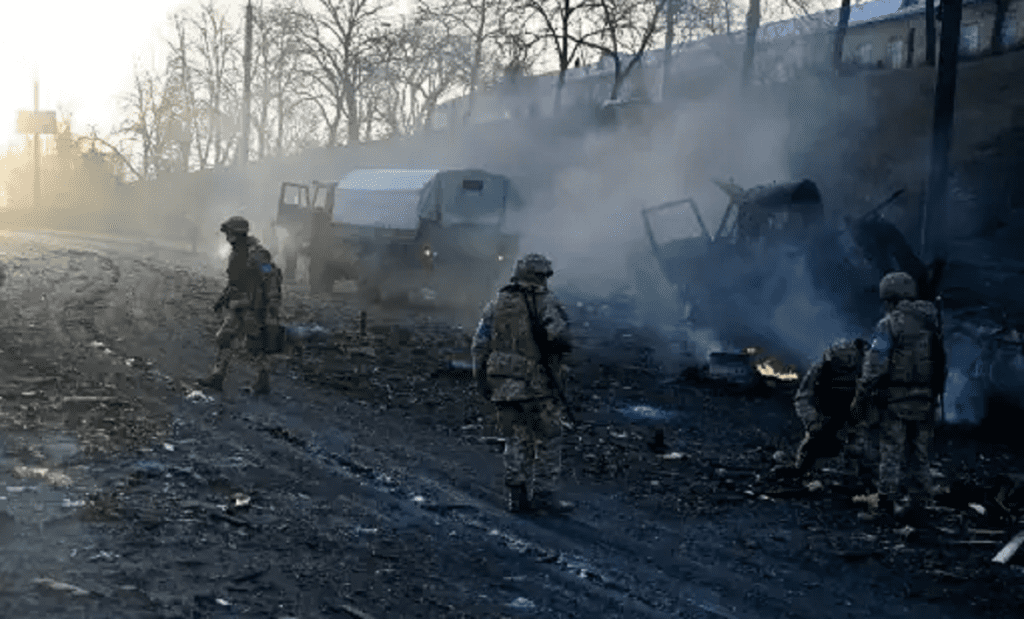For the sake of World Peace, all sides should guarantee Ukraine becoming a neutral country, like Switzerland, never to join NATO or the EU.
By Andrew K.P. Leung (International and Independent China Strategist. Chairman and CEO, Andrew Leung International Consultants and Investments Limited)
 Western media is awash with rhetoric that President Putin has gravely miscalculated on Ukraine, digging himself into a hole and being ostracized by virtually the entire world.
Western media is awash with rhetoric that President Putin has gravely miscalculated on Ukraine, digging himself into a hole and being ostracized by virtually the entire world.
Beijing is being tarred with the same brush. It is not joining the Western quorus of condemnation, “helping to cushion sanctions” on Russia and suspected of harboring a temptation to follow suit on Taiwan.
Ukrainian President Volodymyr Zelenskyy is being hailed as a global icon, a heroic David against a tyrannical Goliath. There is also schadenfreude. Thanks to Putin, the American “City on the Hill” is finally able to prove leadership in reversing the perceived retreat of democracies against rising autocracies.
National security and world order, however, are not black or white, but more Monet than Caravaggio. Behind the smoke and mirrors, life-and-death conundrums must be resolved.
Hailing from St Petersburg of Peter the Great fame, Putin views the collapse of the former USSR as the greatest national humiliation.
Russia is the world’s vastest landmass, larger than Canada, United States and China, in that order. With only 1.87% of the world’s population, it has for centuries embraced an underbelly of buffer states against hostile forces. USSR disintegration saw many of these satellite states joining the opposite camp – the European Union (EU) and the North Atlantic Treaty Organization (NATO), a trans-Atlantic military alliance with missile bases.
Since 1990, NATO has gone through five rounds of enlargement to include former parts of the Soviet Union and several former Warsaw Pact states. (1) At the Bucharest Summit in 2014, NATO supported the inclusion of Ukraine and Georgia in the hope of creating a “Europe whole and free” with EU expansion. (2)
Following the 2004 “Orange Revolution” and the 2014 “Maiden Revolution”, over half of Ukraine’s population outside the pro-Russian eastern provinces increasingly embrace Western values. (3)
Having swallowed waves of EU and NATO expansion, as Russia has become much stronger economically and militarily while American dominance is perceived to be in retreat, Putin is now putting his foot down. NATO missiles in a large neighbor like Ukraine could reach Moscow within a few minutes. This potential Russian “Cuban Crisis” must be confronted once for all.
Beijing is in a tight spot. In face of US hostility, China and Russia have been pushed into a closer “marriage of convenience”, if not a watertight bloc. During the Beijing Winter Olympics, both leaders signed a 5,400-word communique of a “no-limits” partnership. (4)
However, Beijing has to be consistent in defending the United Nation’s Charter of national sovereignty, territorial integrity, and opposition against unilateralism. These are bulwarks against America’s serial infringements of China’s national interests in Taiwan, Xinjiang and Hong Kong, not to mention disastrous US interventions in Iraq, Afghanistan and Syria.
A corollary of unilateralism is the so-called “Right to Protect” (R2P) principle, which was invoked for NATO’s military intervention in Kosovo in 1999 against strong objections from Russia and China in the Security Council. How China could now square the circle when Putin is claiming to protect Russian people in Ukraine against “genocide”?
Hence Beijing’s cautious call for dialogue and peace while acknowledging Russia’s security concerns. Likewise, its abstention (along with 34 other nations) from the UN General Assembly resolution to denounce Russia’s aggression in Ukraine.
Rhetoric and theatre notwithstanding, the Ukrainian crisis is creating a humanitarian crisis of biblical proportions with potentially millions of refugees pouring into neighboring counties, creating a European nightmare.
Apart from humanitarian concerns, the crisis is no good for anybody, Russia, EU, US, and China included.
Russia’s military advances in Ukraine are somewhat stalling in face of brave resistance and logistics constraints. After all, Ukraine is no Crimea. It is about twice as big as Germany. Over half of its 43 million population, especially in the Western half are fiercely patriotic, cherishing freedom and democracy. Imposing a Russian occupation promises to be a prolonged and bloody affair.
Regardless of a state of siege, Ukraine submitted a formal application to join the EU. To ensure due diligence, ascension negotiations are likely to be fraught, not least with Ukraine’s problems of corruption. In any case, sponsoring a protracted war against Russia risks massive disruptions of Russian energy supplies, on which more than a handful of Member states, especially Germany, heavily depend, not to mention disruptions of European markets and economy.
For the United States, glee at Putin’s current predicament aside, an inconclusive war using Ukrainian blood and treasure as a proxy is not likely to win friends and influence people, particularly with mid-term elections coming. Moreover, nuclear-armed to the teeth, Putin seems dead set to fight to the bitter end, according to recent personal soundings by France’s President Macron. (5) Even victory is likely to be pyrrhic as the West would be plagued by a devastated Ukraine and an embittered and even more dangerous Russia. (6)
For China, Ukraine is a key trading partner, with a cornucopia of corn, wheat, uranium and other mineral resources as well as state-of-the-art engineering knowhow. It also occupies a pivotal position of China’s Belt and Road Initiative in Europe. (7) As China’s Ambassador Chang Jun articulated at the UN General Assembly (8), seeking a “balanced, effective, and sustainable” solution will be in the best interests for all.
In a more multipolar world, winner-takes-all is unlikely to work. Full cognizance must be taken of Russia’s deep-seated security concerns as well as political aspirations of the Ukrainian people.
An attractive option for all is a “Switzerland model”, to be guaranteed by Russia, the United States, the EU and NATO. Ukraine is to become a completely neutral country, vowing never to join NATO or the EU, while preserving its own national sovereignty and unique political identity, neither entirely pro-West nor subject to Russian suzerainty.
The exact model requires delicate and inclusive negotiations by all major stakeholders. China may seize the opportunity of acting as a peace broker.
What is at stake is not only peace in Ukraine, but a new model for sustainable resolution of Great Power geopolitical conflicts, which are likely to continue to engage the World Order and the preservation of world peace for the rest of this century.
_________________________________________________________
1 – NATO: Why Russia has a problem with its eastward expansion, DW, Germany, NATO: Why Russia has a problem with its eastward expansion | Europe | News and current affairs from around the continent | DW | 23.02.2022 (accessed on 4 March, 2022)
2 – Bucharest Summit Declaration, North Atlantic Treaty Organization, 3 April, 2008 NATO – Official text: Bucharest Summit Declaration – Issued by the Heads of State and Government participating in the meeting of the North Atlantic Council in Bucharest on 3 April 2008, 03-Apr.-2008 (accessed on 4 March, 2022)
3 – Russia’s at war with Ukraine. Here’s how we got here, NPR, 24 February, 2022 A timeline of Ukraine’s history : NPR (accessed on 4 March, 2022)
4 – China, Russia partner up against West at Olympics summit, Reuters, 5 February, 2022 China, Russia partner up against West at Olympics summit | Reuters (accessed on 4 March, 2022)
5 – Will Continue “Uncompromising Fight” In Ukraine: Putin To French President, NDTV, 3 March, 2022 Will Continue Uncompromising Fight In Ukraine: Russian President Vladimir Putin Tells French President Emmanuel Macron (ndtv.com) (accessed on 5 March, 2022)
6 – What If Russia Loses? A Defeat for Moscow Won’t Be a Clear Victory for the West, Liana Fix and Michael Kimmage, Foreign Policy, 4 March, 2022 What If Russia Loses? | Foreign Affairs (accessed on 5 March, 2022)
7 -Ukraine: China’s Burning Bridge to Europe?, The Diplomat, 2 February, 2022 Ukraine: China’s Burning Bridge to Europe? – The Diplomat (accessed on 5 March, 2022)
8 – Explanation of Vote by Ambassador Zhang Jun at the UN General Assembly on the Resolution on Ukraine, Ministry of Foreign Affairs of the People’s Republic of China, 2 March, 2022 Explanation of Vote by Ambassador Zhang Jun at the UN General Assembly on the Resolution on Ukraine (fmprc.gov.cn) (accessed on 5 March, 2022)
Author: Andrew K.P. Leung (International and Independent China Strategist. Chairman and CEO, Andrew Leung International Consultants and Investments Limited)
(The views expressed in this article belong only to the author and do not necessarily reflect the views of World Geostrategic Insights).







